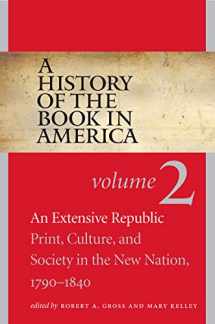
A History of the Book in America: Volume 2: An Extensive Republic: Print, Culture, and Society in the New Nation, 1790-1840 (A History of the Book in America, 2)
Book details
Summary
Description
Volume Two of A History of the Book in America documents the development of a distinctive culture of print in the new American republic.
Between 1790 and 1840 printing and publishing expanded, and literate publics provided a ready market for novels, almanacs, newspapers, tracts, and periodicals. Government, business, and reform drove the dissemination of print. Through laws and subsidies, state and federal authorities promoted an informed citizenry. Entrepreneurs responded to rising demand by investing in new technologies and altering the conduct of publishing. Voluntary societies launched libraries, lyceums, and schools, and relied on print to spread religion, redeem morals, and advance benevolent goals. Out of all this ferment emerged new and diverse communities of citizens linked together in a decentralized print culture where citizenship meant literacy and print meant power. Yet in a diverse and far-flung nation, regional differences persisted, and older forms of oral and handwritten communication offered alternatives to print. The early republic was a world of mixed media.
Contributors:
Elizabeth Barnes, College of William and Mary
Georgia B. Barnhill, American Antiquarian Society
John L. Brooke, The Ohio State University
Dona Brown, University of Vermont
Richard D. Brown, University of Connecticut
Kenneth E. Carpenter, Harvard University Libraries
Scott E. Casper, University of Nevada, Reno
Mary Kupiec Cayton, Miami University
Joanne Dobson, Brewster, New York
James N. Green, Library Company of Philadelphia
Dean Grodzins, Massachusetts Historical Society
Robert A. Gross, University of Connecticut
Grey Gundaker, College of William and Mary
Leon Jackson, University of South Carolina
Richard R. John, Columbia University
Mary Kelley, University of Michigan
Jack Larkin, Clark University
David Leverenz, University of Florida
Meredith L. McGill, Rutgers University
Charles Monaghan, Charlottesville, Virginia
E. Jennifer Monaghan, Brooklyn College of The City University of New York
Gerald F. Moran, University of Michigan-Dearborn
Karen Nipps, Harvard University
David Paul Nord, Indiana University
Barry O'Connell, Amherst College
Jeffrey L. Pasley, University of Missouri-Columbia
William S. Pretzer, Central Michigan University
A. Gregg Roeber, Pennsylvania State University
David S. Shields, University of South Carolina
Andie Tucher, Columbia University
Maris A. Vinovskis, University of Michigan
Sandra A. Zagarell, Oberlin College


We would LOVE it if you could help us and other readers by reviewing the book
Book review



